Brand new from Marin Bikes for 2019 is this long travel 29er called the Alpine Trail. Replacing the outgoing Attack Trail 27.5, the Alpine Trail is an all-mountain bruiser equipped with a 160mm travel fork, 150mm of rear suspension travel, and big 29er wheels wrapped with chunky 2.6in tyres.
Using a tough hydroformed alloy frame and a single pivot suspension design called MultiTrac, the Alpine Trail is designed to sit underneath the company’s flagship Wolf Ridge – a high-end carbon fibre bike with polarizing looks and the distinct R3ACT suspension design.
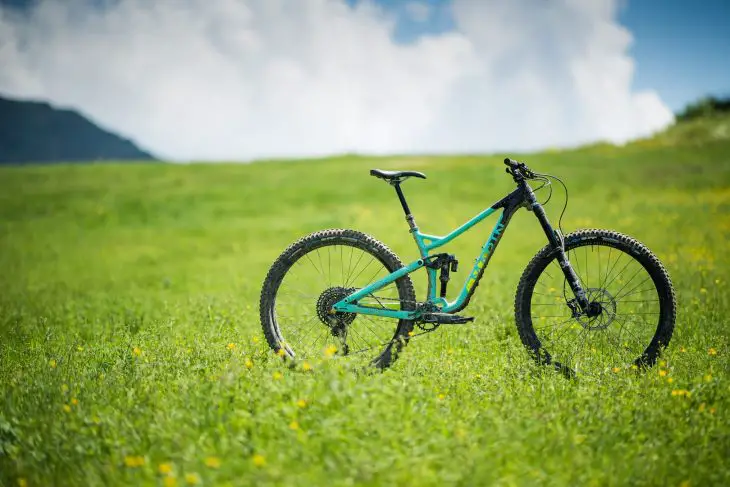
In comparison, the Alpine Trail is built with simplicity, durability and value in mind. This beast of a bike will be offered in two build kits, starting at £2,200 for the Alpine Trail 7, and going up to £3,000 for the Alpine Trail 8 shown here.
Marin Alpine Trail Features
- Long travel all mountain 29er
- Series 4 6061 Hydroformed alloy frame
- Clearance for 29×2.6in tyres
- MultiTrac suspension design
- Trunnion mount 205x65mm metric shock
- 150mm rear travel
- 160mm travel fork
- 65° head angle
- 76° seat angle
- 430mm chainstay length
- 35mm BB drop
- Threaded BB shell
- Internal cable routing
- Bolt-up 148x12mm rear axle
- Available sizes: Small, Medium, Large, X-Large
- Two models available: Alpine Trail 7 (£2,200), Alpine Trail 8 (£3,000)
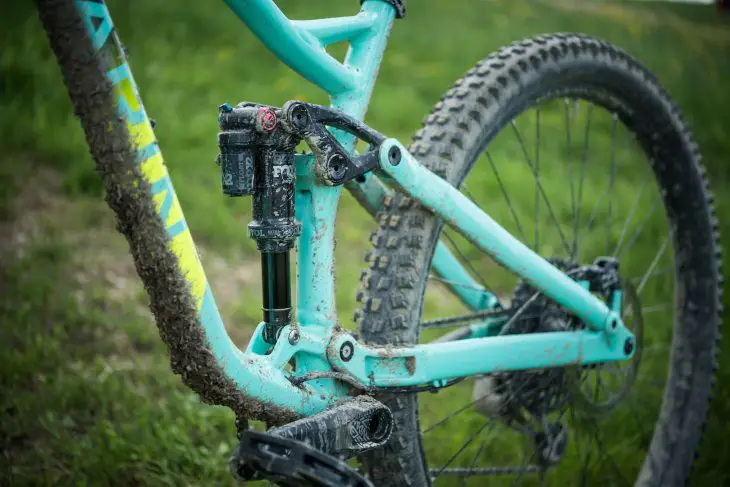
MultiTrac Suspension
After several confusing years of producing bikes with numerous suspension platforms, Marin appears to be consolidating its approach moving forward. The R3ACT suspension design found on the carbon fibre Wolf Ridge will remain as the brand’s pinnacle suspension technology, and you can probably expect to see that range expanded on in the future. Underneath the R3ACT models will sit a line of value-oriented alloy bikes using the MultiTrac suspension platform. These include the current Hawk Hill, Rift Zone, B-17, and now the Alpine Trail.
MultiTrac is a fairly straightforward single pivot suspension design with a rocker activated shock. It’s nothing revolutionary, but Marin states it’s sweated the details to get a high performance bike without having to resort to more complex, and more expensive, suspension designs.
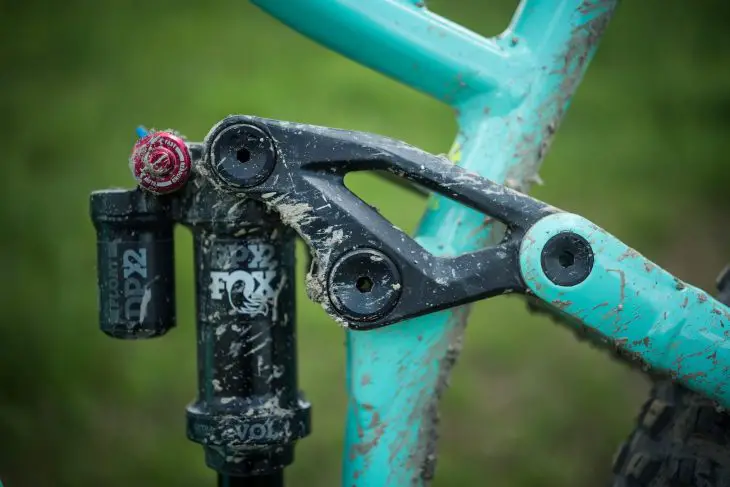
The back end delivers 150mm of travel using a metric-sized Fox Float DPX2 shock. The shock is bolted to the rocker via a trunnion mount, with bearings on either side to help reduce stiction. Marin has spec’d a 205x65mm shock length, which keeps the average leverage ratio quite low at 2.3:1. That means on average, the rear wheel will move 2.3mm for every 1mm of shock stroke. The leverage ratio actually starts higher to begin with though at 2.55:1, which combined with the trunnion mount means the travel is very smooth and active to begin with.
The leverage curve flattens out in the middle to reduce the ‘hammock’ sensation you can get with some full suspension designs, and then turns slightly progressive towards the end of the travel. It isn’t overly progressive though, just enough so that the Alpine Trail is compatible with both high volume air shocks and coil shocks.
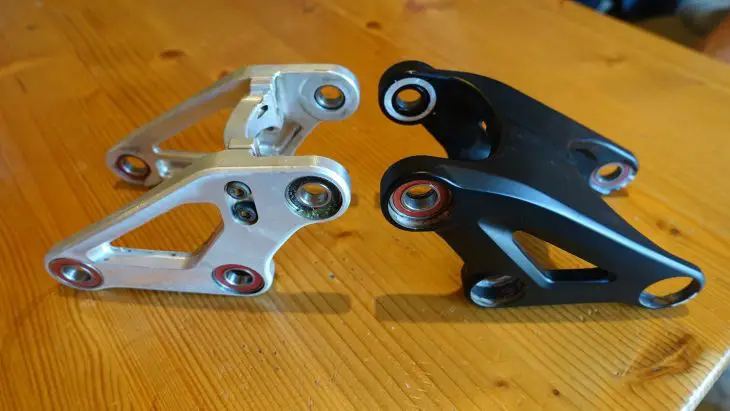
The frame itself is built to be as robust as possible, with thick hydroformed tubes used throughout, a big tapered head tube, forged dropouts, and generous weld areas joining it all together. Sealed bearings are featured throughout, and the main pivot gets locking collet hardware to keep it snug-as-a-bug. The one-piece rocker link is made from two halves of forged alloy which are then welded together and post-machined to create the pockets for the bearing. Marin claims to have made this rocker link stiff enough to keep the seatstays bridgeless, which provides huge clearance around the 2.6in tyres. Clevis pivots on the seatstays complete the burly look.
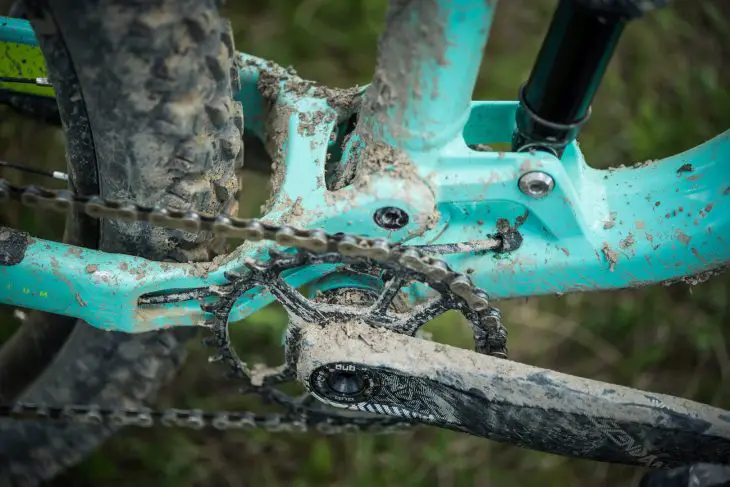
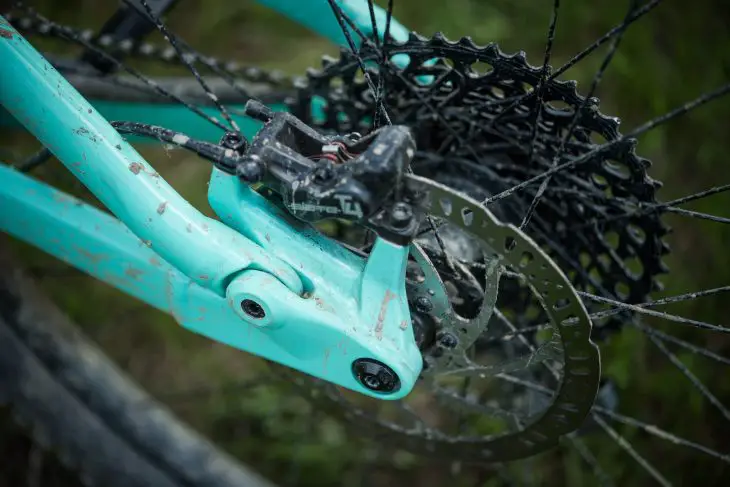
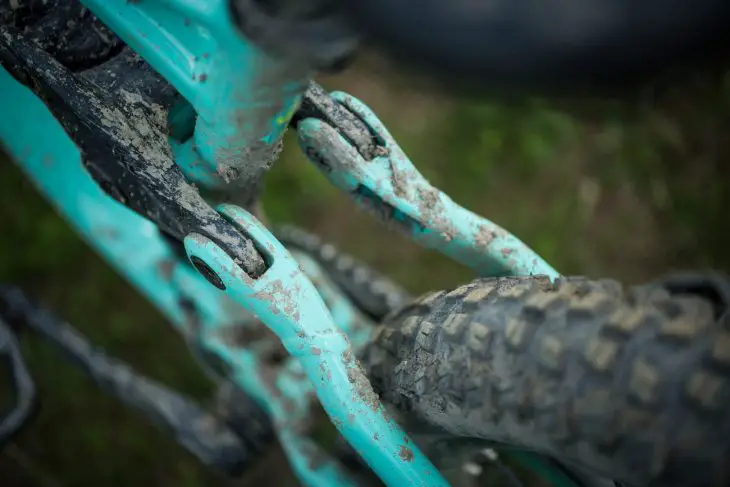
Geometry
Marin has got the numbers on-point for the Alpine Trail. There’s a 65° head angle, a 76° seat angle, and the reach is roomy across the four sizes. The Medium bike I tested measures up at 440mm, which suited me just fine. Marin says it has kept seat tubes short so riders can upsize though, and if you’re a sucker for length, then the XL will get you no fewer than 490 millimetres of the good stuff.
Despite the big wheelbase, the rear centre has been kept snug for a 29er at 430mm. It also doesn’t feel that tall either, since the stack has also kept reasonable at 624mm, despite having that big ol’ fork and 29er wheel on the front.
Build Kits
Marin will offer the Alpine Trail with two build kits using the same frame and suspension design. Both bikes get a 160mm travel fork, 1x drivetrain, a 35mm long stem, 29mm wide (internal) tubeless rims, and 2.6in wide Vee tyres.
The top-end Alpine Trail 8 that I tested comes with a Fox Performance Series suspension package, including the superb Float DPX2 rear shock and the imposing 36 Float fork up front. You get a set of TRP’s 4-piston Slate T4 brakes, a SRAM 1×12 Eagle drivetrain, and Marin’s own-branded wheelset with tubeless compatible alloy rims. Nice touches include the Deity cockpit and a KS LEV Integra dropper post that’s wired to the superb under-the-bar Southpaw lever.
The cheaper Alpine Trail 7 drops £800 off the price, and is spec’d with a RockShox Yari RC fork and an X-Fusion O2 shock. Marin chose the O2 shock as all 2019 X-Fusion shocks have apparently had a performance boost thanks to the addition of a transfer port between the positive and negative air chambers – a Fox-owned patent that recently expired. Brakes step down to a new 4-piston Tektro Orion brake, while shifting is provided by a mostly Shimano SLX 1×11 drivetrain that is cleverly paired to an e*13 9-46t cassette to create a massive, Eagle-beating 511% range.
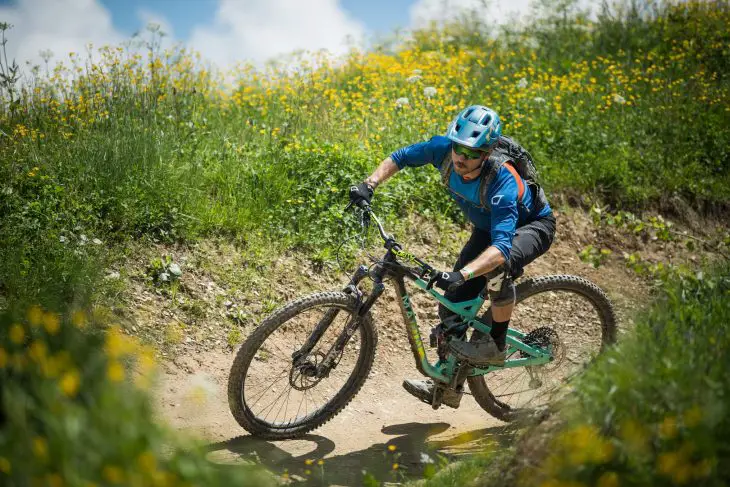
Les Gets Riding!
At Bike Connection in Les Gets this summer, I managed to get a day of riding in on the Marin Alpine Trail to get a feel for what it’s all about. Our ride time was limited to the bikepark, which meant lift-assisted riding on big, flowy, bermed-up descending trails. However, there was a deviation partway down the mountain through the pines on a trail called ‘The Canyon’, which allowed me to get a better sensation of the Alpine Trail’s performance on more natural, rooty terrain.
Thanks to the chairlift and our recommended routes, I didn’t do a whole lot of climbing. The Alpine Trail felt pretty weighty during the little climbing that I did do, with the chunky frame and stocky wheelset keeping any upwards movement a more steady affair. Though the suspension pretty stable under power, I’d need much more time on it on local terrain to make any real conclusions about the Alpine Trail’s efficiency and climbing abilities.
I can say that the Medium I rode fitted well though, with a solid front centre and a decent reach measurement providing plenty of breathing room up front. The wide bars felt pretty big and square to me, though while I’d likely change them for something with more rearward sweep, it didn’t take long to adjust to the broad cockpit.
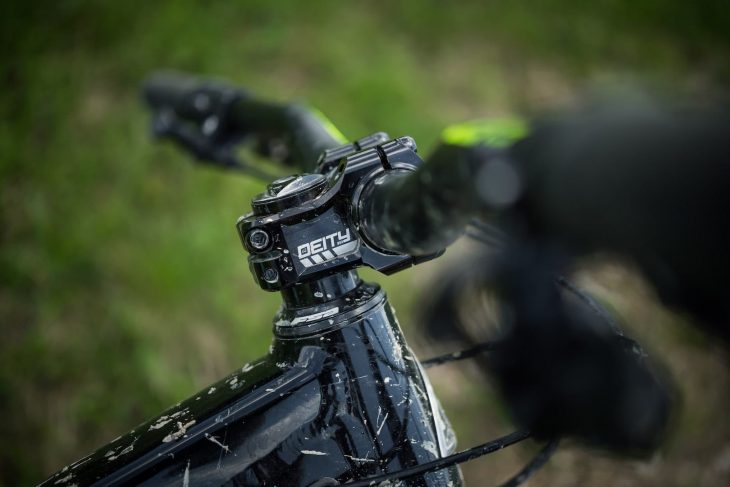
Once pointed downhill and on to the bumpier stuff, the Alpine Trail’s quality suspension made itself immediately apparent. There’s great sensitivity around the sag point, meaning that the rear wheel moves up and over roots and rocks with very little resistance.
The Fox Float DPX2 shock is an excellent match for the MultiTrac suspension design, with a smooth and active feel throughout the travel. Set at 30% sag with the big tubeless tyres at 20/23psi, the Alpine Trail flutters over the rough stuff really well.
Despite the willing suspension though, I never once bottomed-out the rear shock, despite repeatedly hitting a high-speed water bar that I’d managed to crunch through the travel on every other bike I rode that week. That subtle progression at the end of the travel worked in an effective, if unnoticeable way. On these faster, wide-open sections, the supple suspension package, long wheelbase and stout frame meant the Alpine Trail felt more than happy being let of the leash too. It has plenty of ploughability.
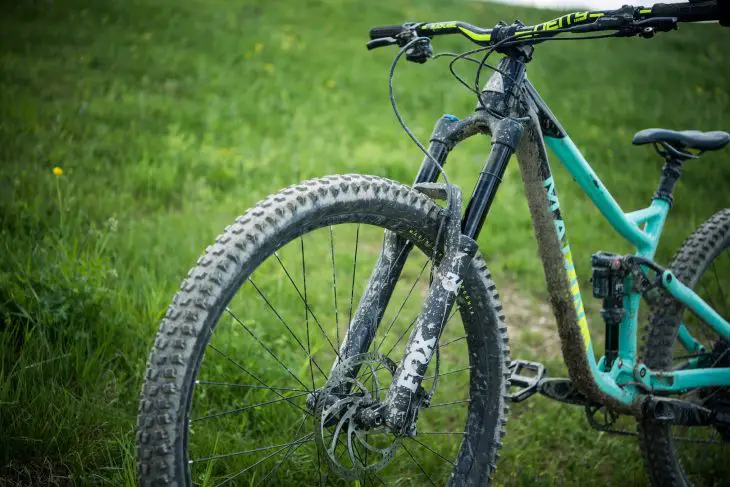
Even with its big travel, the Alpine Trail impressed me with how playful it felt for a 29er. The 430mm rear centre length is a contributing factor, as are the high-rise bars, but I think it was also the active suspension that allowed me to compress and squat the back end before picking up the front wheel easily. The Alpine Trail does feel big in the tighter corners, but not as much so as you’d expect. And once you’re used to the added gyroscopic effect of the 2.6in tyres and heavy wheels, you can really push the bike harder to make sure it makes every turn.
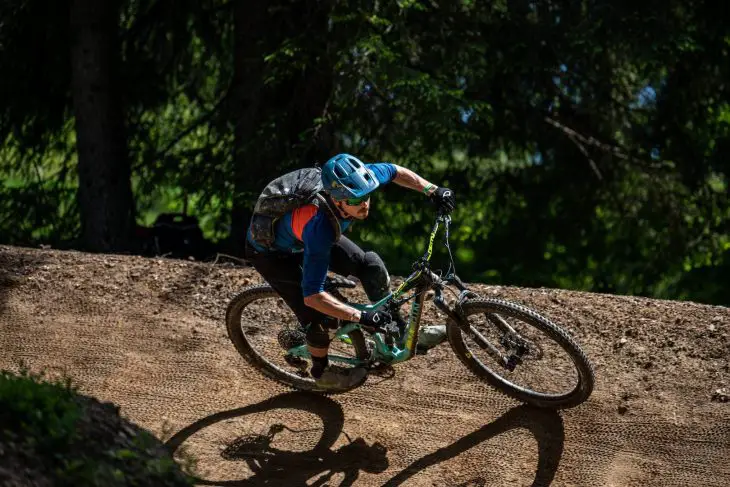
The toothy Vee tyres did squirm a little under pressure on the sculpted berms of the bikepark, but I was surprised how well they worked on hardpack. Mind you, when the corner tread does break free, it can slide pretty quickly. In the woods on much muddier, rootier terrain though, the Flow Snap tyres were much more in their element, with the blocky tread assuredly latching on to loose surfaces.
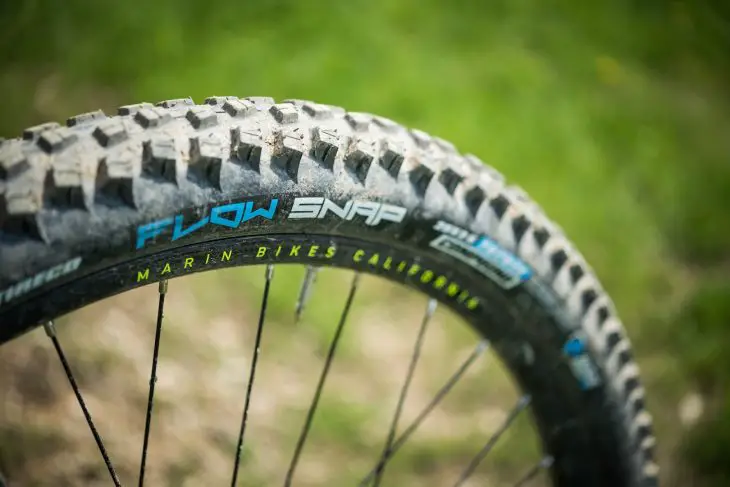
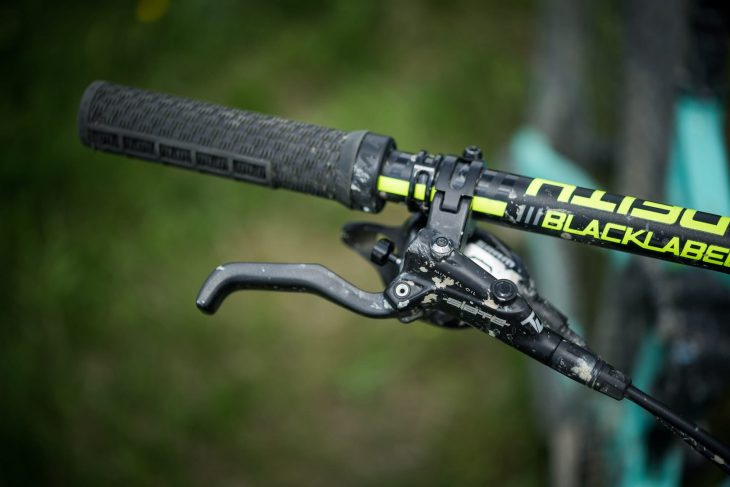
The only issue I had with the Alpine Trail was the TRP Slate T4 brakes, which lacked brute power compared to other 4-piston brakes on the market. Just like the pair of G-spec brakes I tested and reviewed, the Slate T4’s do have superb modulation, but you really need to pull the lever hard if you need to stop in a hurry, which you kind of do a lot on a long travel 29er with big tyres.
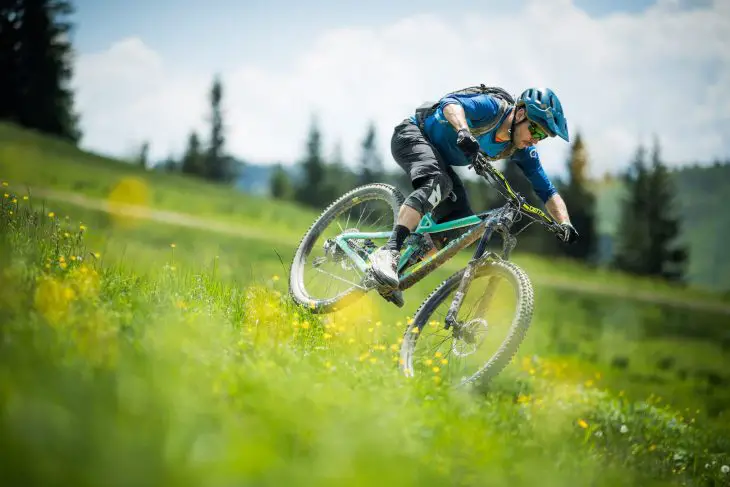
Overall
I can only offer early impressions on the Alpine Trail, but so far those impressions are very favourable. The frame is solid and well executed, and the suspension package is top-notch, proving you don’t need highly complex suspension systems just to get a competent all mountain bike.
More time would be needed to test the Alpine Trail’s all-round capabilities, and I’d want to play around with the cockpit and wheelset to see exactly what this bike can do, though I’m already impressed with how playful and intuitive this bike is to ride straight out of the box.
For more information on the Alpine Trail, head to the Marin Bikes website.
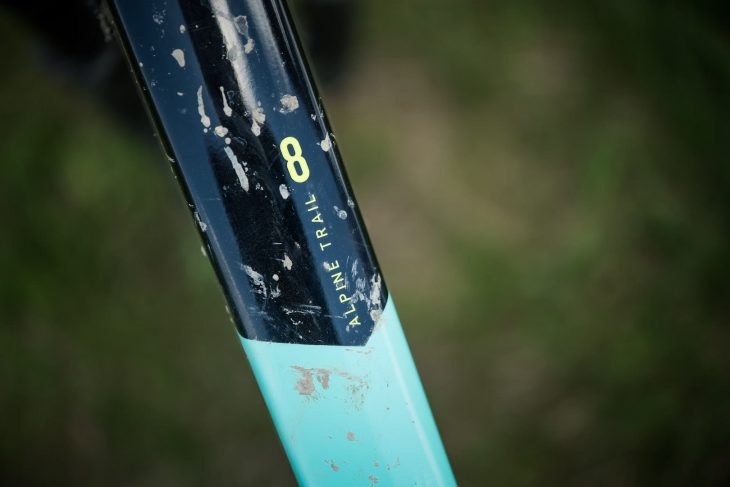
2019 Marin Alpine Trail 8 Specifications
- Frame // Series 4 6061 Hydroformed Alloy, 150mm Travel
- Fork // Fox 36 Float, Performance Series, 160mm Travel
- Shock // Fox Float DPX2, Performance Series
- Hubs // Forged Alloy Sealed Bearing, 110x15mm Front & 148x12mm Rear
- Rims // Marin Double Wall Alloy, 29mm Internal Width, 32H
- Tyres // Vee Tire Co Flow Snap Enduro Tackee Compound 29×2.6in Front & Rear
- Chainset // SRAM Descendent 6K Alloy, 34t X-Sync 2 Chainring
- Rear Mech // SRAM NX Eagle, 12-Speed
- Shifter // SRAM NX Eagle, 12-Speed
- Cassette // SRAM GX Eagle, 10-50t, 12-Speed
- Brakes // TRP Slate T4, 180mm Rotors Front & Rear
- Bar // Deity Blacklabel, 800mm Wide, 25mm Rise
- Stem // Deity Copperhead, 35mm Long
- Grips // Marin Lock-On
- Seatpost // KX LEV Integra, 150mm Travel
- Saddle // WTB Volt Race
- Size Tested // Medium
- Sizes Available // Small, Medium, Large, X-Large
- RRP // £3,000
Disclosure
Bike Connection Agency covered flights and accommodation for this trip
Review Info
| Brand: | Marin |
| Product: | Alpine Trail 8 |
| From: | Paligap, paligap.cc |
| Price: | £3000 |
| Tested: | by Wil Barrett for 1 fine day in the Les Gets bikepark |
Comments (3)
Leave Reply
Post Comment
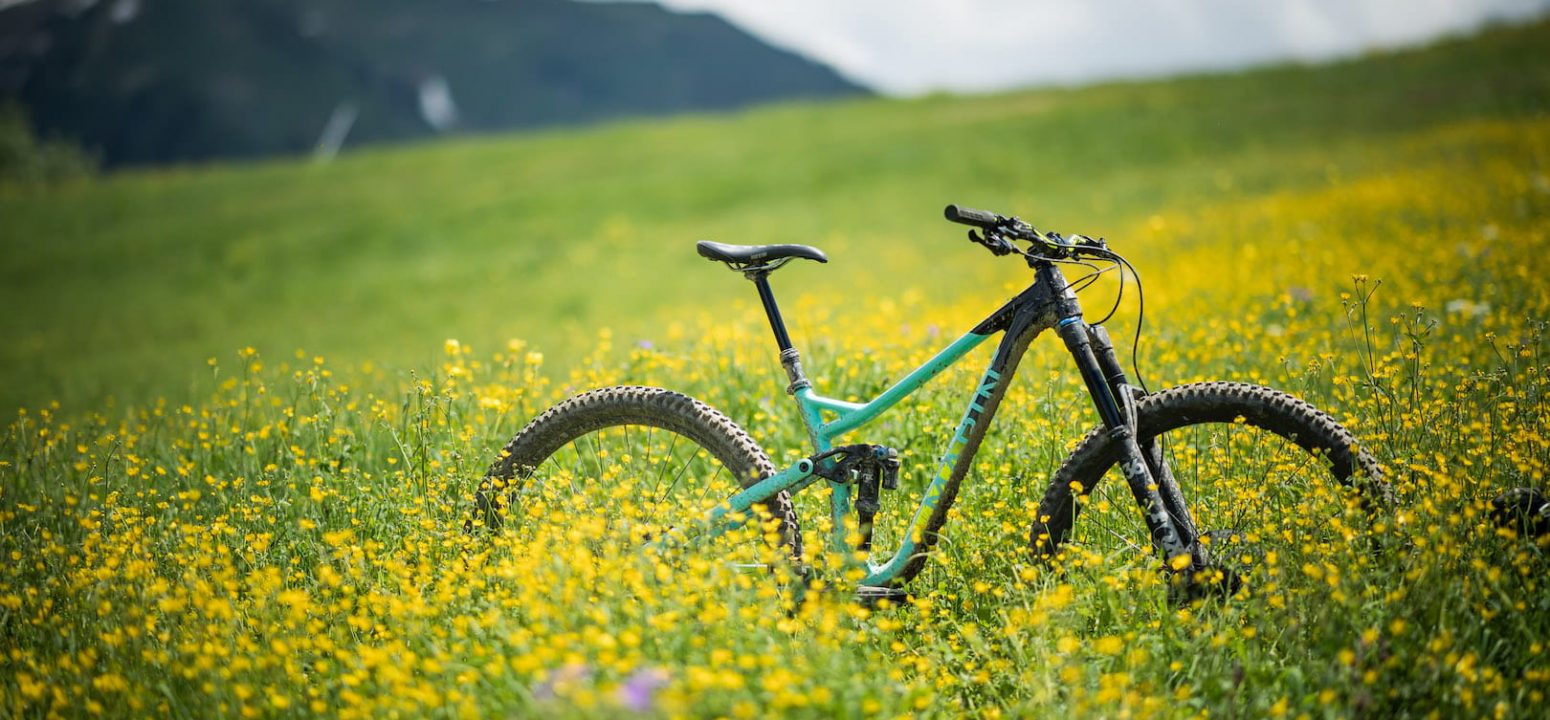
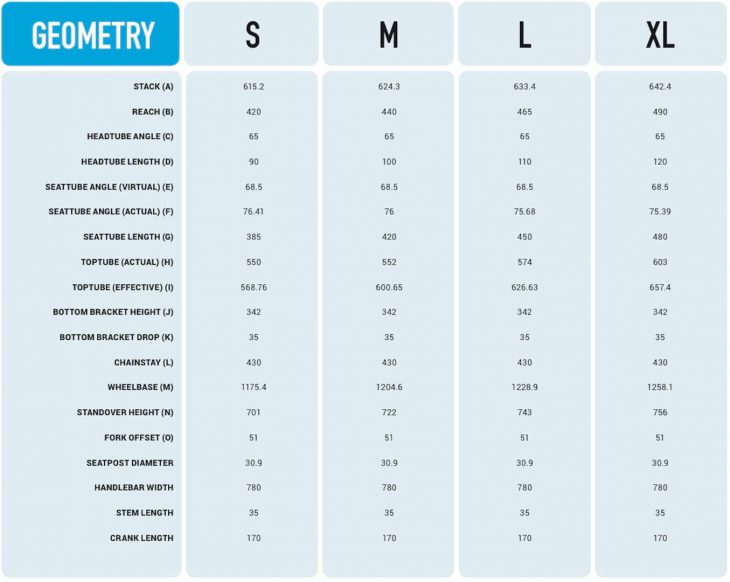
I look at that and all I can see is a 29er version of the original Spesh’ Pitch which can only be a good thing.
Wow, nothing like the old Alpine Trail! 🙂
Not exactly like Pitch, as Pitch was proper HL, 4 bar suspension rig. This one is single pivot rocker activated or Faux Bar.
Interesting why they choose to go with FB instead of HL?
After Specialized’s patent expiry many companies decide to have a go on good ‘ole Horst Link themselves…
I.